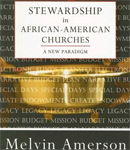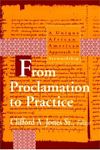Lectionary Commentaries

STEWARDSHIP SUNDAY (TITHING YOUR FINANCES)
LECTIONARY COMMENTARY
Sunday, September 30, 2012
Reginald Bell Jr., Guest Lectionary Commentator
Ph.D. student, University of Memphis, Memphis, TN
Lection – Luke 16:1-13 (New Revised Standard Version)
(v. 1) Then Jesus said to the disciples, “There was a rich man who had a manager, and charges were brought to him that this man was squandering his property. (v. 2) So he summoned him and said to him, ‘What is this that I hear about you? Give me an accounting of your management, because you cannot be my manager any longer.’ (v. 3) Then the manager said to himself, ‘What will I do, now that my master is taking the position away from me? I am not strong enough to dig, and I am ashamed to beg. (v. 4) I have decided what to do so that, when I am dismissed as manager, people may welcome me into their homes.’ (v. 5) So, summoning his master’s debtors one by one, he asked the first, ‘How much do you owe my master?’ (v. 6) He answered, ‘A hundred jugs of olive oil.’ He said to him, ‘Take your bill, sit down quickly, and make it fifty.’(v. 7) Then he asked another, ‘And how much do you owe?’ He replied, ‘A hundred containers of wheat.’ He said to him, ‘Take your bill and make it eighty.’ (v. 8) And his master commended the dishonest manager because he had acted shrewdly; for the children of this age are more shrewd in dealing with their own generation than are the children of light. (v. 9) And I tell you, make friends for yourselves by means of dishonest wealth so that when it is gone, they may welcome you into the eternal homes. (v. 10)
“Whoever is faithful in a very little is faithful also in much; and whoever is dishonest in a very little is dishonest also in much. (v. 11) If then you have not been faithful with the dishonest wealth, who will entrust to you the true riches? (v. 12) And if you have not been faithful with what belongs to another, who will give you what is your own? (v. 13) No slave can serve two masters; for a slave will either hate the one and love the other, or be devoted to the one and despise the other. You cannot serve God and wealth.”
I. Description of the Liturgical Moment
Stewardship Sunday, this year with an emphasis on tithing one’s finances, is a day whose presence on the calendar is welcomed by all pastors and those who serve in various capacities in ministry that depend upon donations to operate effectively. The African American Lectionary has promoted stewardship since the inception of its lectionary and this year is no different for several reasons. First, we continue to feature it because stewardship is often minimized in terms of its robustness/completeness of meaning. So, the lectionary has discussed stewardship in every conceivable way. See units from 2008–2011. Second, stewardship has been promoted because it is a lynchpin of the Christian faith and the Christian Church; without stewardship as a biblically-based practice, the Church opens its self to being no more than any other organization that does good works and receives donations. Third, discussions of stewardship can cause pastors and congregations to squirm; preachers are not quick to want to ask congregants to be better stewards, and congregants typically only define stewardship in financial terms. Both are wrong. It is the job of pastors to speak firmly, affirmatively, and with totality of definition about stewardship and to do so regularly. If not pastors, who? Further, those in the household of faith who define stewardship primarily in financial terms have much to learn. They are missing the vastness of the biblical and theological scope of stewardship and confining their ability to operate in the totality of the work of a good steward which Jesus consistently promotes. Such promotion is found in Luke 16.
II. Biblical Interpretation for Preaching and Worship: Luke 16:1-13
Part One: The Contemporary Contexts of the Interpreter
I grew up in a middle-class family with two parents and two siblings. My father was and is a business owner and a pastor. Through his practices as a pastor and a business owner, he taught me much about stewardship in its fullness, especially the benefits of being concerned about and trying to help save the souls of folks. While my family was moderately okay financially, life for so many in much of Birmingham, Alabama, was not okay.
When I grew up, Birmingham was mainly black, female, and poor. On top of that, its racial history of black subjugation was never far from the surface; it had left a trail of “never can quite catch up” economic and educational hardship among blacks. It is still visible in the white flight from the state, the fact that blacks are as bad off economically today as they were during the oppressive moments of the 1950s and ‘60s, and it is attested by the not-separate-but-still-greatly-unequal public school system in Birmingham. Birmingham is still mainly black (73%). The median household income in 2011 was less than $20,000 and 26.4% of the city’s residents live below the federal poverty level.1
Whenever I am to preach or teach about stewardship as it relates to money, I remember Birmingham. I remember the faces of poor classmates, poor members of the church my father pastors, and the city’s continuing history of poverty and illiteracy, especially among its black residents and even many of its white residents. Remembering Birmingham keeps before me in a tangible way those in need of so much, and it makes it incumbent upon me to preach and teach about stewardship—not just as a theological proposition, but also as a road map for the Church to meet the needs of God’s world.
Part Two: Biblical Commentary
The focus in much of the Gospel of Luke is material possessions. All of chapter 16 (where our pericope for focus is found) in some form concerns the use and/or attainment of material possessions. In 16:1-13 (our pericope), the focus is on one’s attitude concerning attaining and using material possessions. Verses 16:1-8a contain the parable of the dishonest manager (also known as the parable of the Unjust Steward) and thus the common use of this story for stewardship messages. Verses 8b-13 are the sayings appended to this parable.
Someone said, “Get all you can, and give all you can.” I believe these words provide a clear sermonic layout for the preaching of Luke 16:1-13. My preference is to get at sermon issues/themes (most often) through an indirect but familiar route. Jesus does the same in Luke 16. He uses a parable to give commentary on stewardship and the accumulation of material possessions.
The Parable Proper: Getting All You Can
A rich man finds out his manager has squandered some of the rich man’s assets. He fires him. Just before he turns in his files listing the assets and debts of the rich man, the fraudulent manager decides, since he is not willing or unable to dig ditches (maybe he has a “white collar work only” mentality) and is too prideful to beg, that he will concoct another scheme to gain assistance to meet his needs. So, he goes to visit those who are in debt to his master. He allows them to lessen what they owe. One debtor owed 100 jugs of olive oil and the fraudulent manager reduced it to 50. Another owed a hundred containers of wheat and the manager reduced it to 80. These are the two instances listed. Undoubtedly, since the manager was out to make sure he had a place to sleep and eat (for who knows how long), he used more than just these two debtors to set himself up for the future or until he could find other employment after the story of what he did died down.
The fraudulent manager is complimented by his master, not because he steals or mismanages the manager’s possessions again, but because he clearly is giving up his commission in lowering the costs of what was owed. Just as is still customary when certain goods are sold, the seller gets a commission. The manager mistreated the possession of his boss and thereby brought himself to the point of being fired. However, he was just shrewd enough to know how to avoid total ruin. For more on this, see J. D. M. Derrett’s article “‘Take Thy Bond . . . and Write Fifty’ (Luke xvi.6): The Nature of the Bond.”2
This steward was out for himself. Life was all about what he could get for himself. After mistreating his employer and being fired, I believe he is forced to go without the commission that he could have rightfully had, had he done the right thing all along. Unbelievers may show great skill in amassing money within their generation but we follow their examples at our peril if we only amass it for ourselves. The steward was entitled to earn a living but not at the expense of others. This is the cry of the day from those occupying homeless shelters, who have poor-paying back-breaking jobs, and who want economic fairness to be a reality in the workplace and all spheres—NOT at the expense of others! We are stewards of unrighteous mammon if we devour the homes of others, the savings of others, and the land of others, even if we do so legally. Everyone knows that a profit can be made without harming others. However, those who misunderstand what it means to be good stewards, which includes at a minimum not stepping on anyone or unnecessarily causing harm to make money, see themselves as only responsible to themselves. There is nothing wrong with getting; however, how you get what you get will always matter to God and humanity.
Sayings Attached to the Parable: Giving All You Can
Verse 8 is the crux of this parable. It makes clear that the unscrupulous pursue with more vigor and intentionality their determined ends than do those who claim to be “Children of Light.” In other words, those who are disciples can learn something from this manager who betrays his boss. What is that something? Joseph Fitzmyer says,
I don’t believe Jesus is commending the rich manager or the fraudulent steward as examples to follow. We know what the Bible says in the main about rich men. And the dishonest steward used dishonesty and shrewdness as his modus operandi. “Children of light” are to use wisdom, honesty, and faithfulness—wisdom in how we earn and save our money, honesty in how we obtain and increase our money, and faithfulness to God and humanity in how we use money as stewards of God. By operating in this fashion, and using our stewardship to draw people to Christ, we are investing in folks’ souls. A great reward awaits us for such work when all of our earthly goods have worn out and rotted. So, when we are faithful stewards, not proprietors, God is pleased, the unsaved win, and we win. Someone ought to say, Amen.
As Jesus addresses the issue of faithfulness and honesty in the handling of material possessions, he doesn’t say be shrewd. Instead he says, “If you are faithful with a little (getting to work on time, keeping your word, doing your part in your family, etc.) you will be faithful with a lot” (evangelism, hospitality, service to the poor, continuously being in prayer, great financial wealth etc.). To make clear that the focus is on material possessions, Jesus next says, “If you have not been faithful with dishonest wealth, who will entrust to you the true riches?” (v. 11).
Jesus is telling the disciples AND US how much faithfulness we lack when it comes to the BIGGER matters that we must address as his stewards. These require that we give our all, especially our money. Those who are “Children of Light” should have enough wisdom or prudence to know that tithing as a part of one’s stewardship has little to do with money and much to do with our heart-felt and sincere interest in the expansion of the purposes of God and the coming of the Kingdom on earth as it is in heaven. Such are BIG matters in deed and not to be squandered as the manager did the property of his employer. They are matters that require our most effective work and our most serious attention. They do not require shrewdness; that’s what the world relies upon. They require our wisdom, honesty, and faithfulness. After all, we owe our Lord a debt we can never repay; the least that we can do is be faithful stewards.
Choose ye this day whom you will serve: God or money. Then, if you commit your life and all of your possessions to the Great Steward, be not dismayed or disturbed when the world makes light of your concerns or the issues for which you fight; the Great Steward knows such a disciple can be trusted with much and this disciples shall be rewarded much.
Celebration
Get all you can and give all you can. How we get and use our money changes the world. Thank God that as Children of Light, we know the right way to get it and use it. We now use it to help the Kingdom come on earth as it is in heaven. We are stewards who tithe with pride. We tithe with assurance. We tithe with gratitude. We tithe with a cheerful attitude. We tithe because we have been entrusted with weighty matters. As the icing on the cake, because God can count on our faithfulness in small matters, we will be entrusted with true riches.
Descriptive Details
The descriptive details of this passage include:
Sights: Charges being brought that an employee is squandering his employer’s property; a rich man firing a crooked employee; a man too weak to dig for a living and too proud to beg; a fired employee handing out debt papers and letting those in debt lower what they owe; jugs of olive oil; hundreds of containers of wheat; eternal homes, a slave and two masters;
Sounds: The sounds of a person being told he’s fired; debtors signing new payment papers;
Colors: The clothes and the office of a rich man; the not-quite clear color of olive oil; beige wheat; and
Emotions: Upset by an employer; panic by a fired employee; disgust at the dismal operating of disciples in weighty matters.
III. Information That Clergy and Others Can Use
Websites and Books
- The Francis Schaeffer Institute of Church Leadership has a blog on a several-year research project into what the Bible has to say on stewardship. Online location: http://biblicalstewardship.net/statistical-research-on-stewardship/
 |
Amerson, Melvin. Stewardship in African-American Churches: A New Paradigm. Nashville, TN: Discipleship Resources, 2006. |
 |
Jones, Clifford A., Sr., ed. From Proclamation to Practice: A Unique African American Approach to Stewardship. Valley Forge, PA: Judson Press, 1993. |
Notes
1. Statistics obtained from http://quickfacts.census.gov/qfd/states/01/0107000.html (accessed 1 May 2012).
2. D. M. Derrett’s “‘Take Thy Bond . . . and Write Fifty’ (Luke xvi.6): The Nature of the Bond,” Journal of Theological Studies 23 (1972) 438–440. See also Naphtali Lewis, “The Meaning of syn hēmiolia and Kindred expressions in Loan Contracts,” Transactions and Proceedings of the American Philosophical Association 76 (1945) 126–139.
3. Fitzmyer, Joseph A. The Anchor Bible. The Gospel According to Luke (X–XXIV). New York: Doubleday, 1985. pp. 1106–1107.



